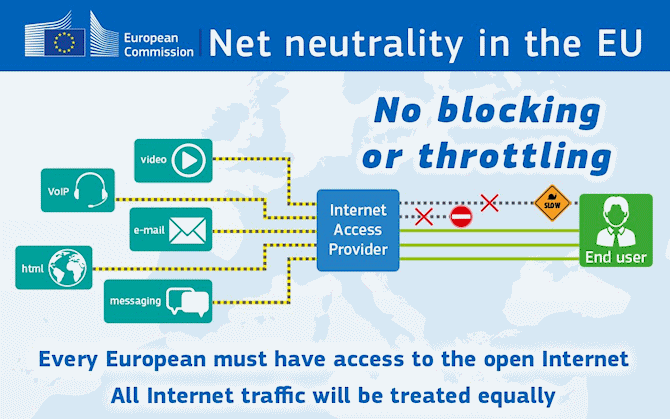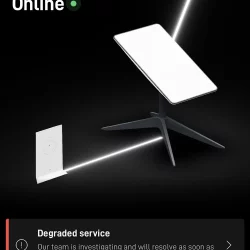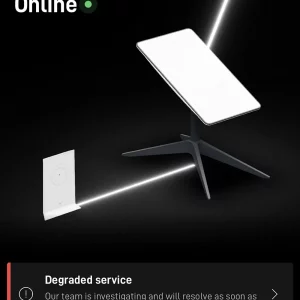EU Approves Law to Protect Net Neutrality and Free Mobile Roaming
As expected the European Parliament has, without further change, today given the final approval needed for new rules to be introduced that aim to protect open Internet access (Net Neutrality) from unfair restrictions and put an end to costly mobile roaming charges, but there are plenty of loop holes.
At present there are no firm rules, save for a few voluntary guidelines, to stop broadband ISPs or mobile network operators from imposing unfair restrictions on your Internet access or speeds (e.g. blocking Skype / legal websites or throttling your speed to FTP, YouTube etc.).
Similarly using a mobile phone while roaming around Europe can still be quite a costly experience, but all this is about to change.
Andrus Ansip, EC VP for the Digital Single Market, said:
“The voice of Europeans has been heard. Today’s vote is the final result of intense efforts to put an end to roaming charges in the European Union and to safeguard the open internet. As from mid-June 2017, Europeans will pay the same price to use their mobile devices when travelling in the EU as they do at home. And they will already pay less as from April 2016.
This is the culmination of hard work by the Commission, and in particular by former Vice-Presidents Viviane Reding and Neelie Kroes, to tackle high roaming charges. This is not only about money; this is about bringing down barriers in the Digital Single Market.
Today’s achievement is a first step towards a Telecoms Single Market. More work will need to be done to overcome national silos and address challenges such as spectrum coordination. We will go further as early as next year with an ambitious overhaul of EU telecoms rules. We count on the support of the European Parliament and Member States to make this happen.”
The biggest agreement is that of the EU’s move to end mobile roaming charges for those travelling between member states (France, Germany, UK etc.), which means that while roaming you’d simply continue to pay whatever you do today for your existing domestic (home) tariff.
The cost of EU roaming has come down hugely in recent years and from 30th April 2016 it will fall again, with the maximum surcharge that mobile operators can levy dropping to €0.05 (£0.04) per minute for calls, €0.02 (£0.01) per text and €0.05 (£0.04) per MegaByte of data (Mobile Broadband). But after 15th June 2017 these roaming charges will be abolished.
However a Fair Use Safeguard will be introduced, which is designed to help prevent “abusive use of roaming services, such as ‘permanent roaming’, which otherwise could undermine domestic markets” (e.g. if you live on the south coast of England then you won’t be able to use an operator in France if it’s cheaper than the UK, at least not without attracting an extra fee).
Some mobile operators will also still be able to apply a surcharge to roaming, but only in “exceptional circumstances” (e.g. if struggling to recover their costs). Mind you it’s unclear how these two measures will be enforced and monitored.
Net Neutrality
The other major change is with the adoption of new rules to protect Net Neutrality (i.e. the principle of treating all Internet traffic as equal), which is designed to stop mobile providers and fixed line broadband ISPs from blocking or severely restricting your access to legal Internet content and services (e.g. Skype, YouTube, Facebook etc.).

At this point the media is today rife with stories about how the new rules may do little to protect Net Neutrality and could instead create a two-tier Internet, although this rather overlooks the fact that we already have such an Internet and the true meaning of Net Neutrality doesn’t strictly exist in the first place.
Like it or not most data that travels over a computer network will become subject to some degree of management or adjustment. Similarly big ISPs already have to pay commercial Content Delivery Networks (CDN) and peering firms in order to deliver content to you because those are the services that big content produces, such as Netflix, use to ensure the best quality.
Net Neutrality Rule (Extract from the Agreed Text)
Providers will be required to treat all traffic equally when providing internet access services, without discrimination, restriction or interference, and irrespective of the sender and receiver, the content accessed or distributed, the applications or services used.
They may use reasonable traffic management measures, but such measures must be transparent, non-discriminatory, proportionate and not be based on commercial considerations. Traffic management measures must not monitor specific content and must not be maintained longer than necessary.
Measures going beyond such reasonable traffic management (for example, blocking or throttling) will be prohibited, except for a limited number of cases defined in the Regulation.
The new rules clearly contain some caveats, such as support for “agreements on services requiring a specific level of quality“, which has many people worried about the potential for a two-tier Internet and yet without such conditions it would be very tricky for commercial IPTV (Pay TV) style services to be delivered over your broadband line.
At the same time the rules make it harder for ISPs to act like a digital Mafia, which is a controversial approach that occurs when ISPs pressure content providers into paying them back for service delivery. The correct approach for ISPs is to simply adjust the prices that they charge consumers for the service, which is the normal way of doing things.
A number of other exceptions have also been included, which again are necessary in order to allow the use of network security features (e.g. Internet anti-virus, anti-DDoS) and or to impose blocks against truly illegal content, such as child pornography or court / public authority ordered restrictions against Internet piracy websites.
The rules also add an exception that allows ISPs to offer optional features, such as email spam filters or Parental Controls (the latter may block pornography etc.), although it’s specifically stated that this must be done “with the prior request or consent of end-users and the possibility to withdraw the consent, and thus such filters, at any time” (i.e. ISPs can’t impose default network-level censorship / filtering without first getting customer approval).
Of course not everybody will be happy about all this because if you make compromises for some things then there’s always a risk that those same exceptions could be adjusted to cover other areas too. Sir Tim Berners-Lee, inventor of the World Wide Web (WWW), has similarly called the proposals “weak and confusing” and highlighted several potential problems (here), a few of which are shared by online content providers (here).
The problem, as expressed earlier, is that the modern Internet is more complicated than the one which Sir Tim helped develop and if you impose true Net Neutrality then some of the legitimate products that exist today may fall foul of the rules.
As a result what we end up with is a shaky compromise, but in reality that’s more or less what today’s Internet already represents and so it’s really only protecting the status quo (i.e. no change). In that sense, did we really need all this new regulation? Time will tell, but we don’t anticipate any sweeping changes in the market on this side of the pond.
Nicholas Lansman, ISPA Secretary General, said:
“ISPA has long supported the principle of a free and open Internet, and the UK, with its advanced digital economy, has generally had a less emotive debate about ‘net neutrality’ than other countries. Now that the proposals have passed it is important that the UK Government’s approach enables ISPs to remain flexible, respond to user demands and freely offer services like parental controls.”
Otherwise the measures adopted today will be completed by an ambitious overhaul of EU telecoms rules in 2016. The Broadband Stakeholders Group (BSG) will also shortly need to adjust their existing Open Internet Code of Practice for the UK to match the new EU legislation, which already follows a broadly similar approach except for the fact that the Code is voluntary and the new EU legislation is mandatory (details).
EC Q&A on the New Roaming and Net Neutrality Rules
http://europa.eu/rapid/press-release_MEMO-15-5275_en.htm
Mark is a professional technology writer, IT consultant and computer engineer from Dorset (England), he also founded ISPreview in 1999 and enjoys analysing the latest telecoms and broadband developments. Find me on X (Twitter), Mastodon, Facebook and Linkedin.
« BTOpenreach Offer Broadband ISPs the Option of Slower Fault Repairs
Latest UK ISP News
- FTTP (5571)
- BT (3526)
- Politics (2549)
- Openreach (2308)
- Business (2279)
- Building Digital UK (2250)
- FTTC (2049)
- Mobile Broadband (1987)
- Statistics (1796)
- 4G (1676)
- Virgin Media (1634)
- Ofcom Regulation (1472)
- Fibre Optic (1405)
- Wireless Internet (1399)
- FTTH (1382)





















































Comments are closed